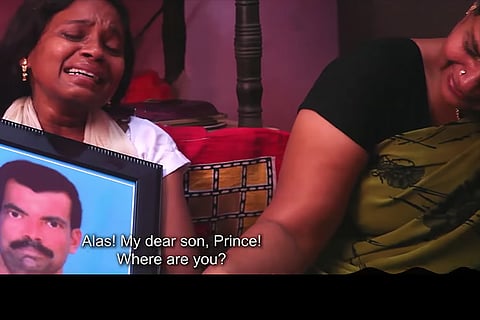

The Ockhi cyclone that unleashed its fury on the southern coast of India in November last year, destroyed everything in its path - land, lives, livelihoods. Nearly a year later, Divya Bharathi's documentary Orutharum Varela (Nobody Came) examines the culpability of a government, its representatives and above all, its people.
Critically acclaimed documentary filmmaker and activist Divya Bharathi released her film on YouTube on Saturday. The 1 hour 40 minute long documentary has already garnered over 66,000 views on the site.
The documentary tells the horrors that the fishing community in Thoothoor village underwent through a series of interviews with families of fishermen who died at sea.
Interspersed with the press conferences of an arrogant administration in a time of crisis, the documentary holds a mirror up to not just the central and state governments' dereliction of duties but also to the media and the people. The tone of these press conferences shows a defensive government as opposed to one that should have been reassuring people in the face of death and destruction.
Images of mothers and wives scrambling to touch the ocean, which contains the mortal remains of their men rattle the conscience of the viewer.
‘Where were they when we needed them?’
Attacking the claim that cyclone warnings had been given at the earliest possible time, the fishermen who survived the tragedy recount that they had left the shores of Kanyakumari as late as the nights of November 28 and 29, when reports of heavy rainfall were already incoming from publicly available data sets. However, it was only on November 30 that the first warnings had been issued to them, when those who would lose their lives had already ventured out deep into the sea.
Post tsunami, Tamil Nadu had been granted hundreds of crores in rupees to equip itself with early warning systems and disaster preparedness. But none of this came to the rescue of the fishermen in their hour of need. They ask, “This is the second largest naval force in the world but they couldn't go beyond 200 nautical miles? Then why the hell does it exist?”
The documentary also sheds light on the corruption involved in government projects planned along the coast, re-opening the still raw wounds of a community that has been disenfranchised by the very people whose sworn duty it is to protect them.
Every single claim of Tamil Nadu Chief Minister Edappadi Palaniswami, Defence Minister Nirmala Sitharaman and Kanyakumari Member of Parliament and Union Minister Pon Radhakrishnan comes up for examination in the documentary, as those who lost their loved ones share their stories.
Communalising a crisis
In a political climate charged by the vilification of minority communities, the documentary touches a raw nerve as it exposes how the narrative surrounding the ordeal was communalised.
The fishing villages along the coast of Tamil Nadu have a sizable population of Christians. The communal vitriol spewed by members of the ruling BJP only added fuel to a burning fire of apathy.
When the villages staged a protest calling attention to the plight of the dying fishermen, BJP National Secretary H Raja criticised it, terming it a ‘religious war.’
In a spitting counter, the fisherfolk say, "We are not divided by caste and religion. If you want to divide us, the loss is yours."
However, the common terms reserved to silence those being critical of the government, such as ‘anti-national’ and ‘traitor’, continue to be heaped on grieving families fighting for their rights.
“How will you run your government if there are no people?” they ask.
‘RK Nagar more important than our lives?’
Delving beyond the government and politicians, the documentary also lays the blame on the media's portrayal of the tragedy. The tragedy struck at the time of the RK Nagar bye-polls in Chennai city. Amidst the clamour to have the ‘most shocking expose’ or land the ‘exclusive interview’, media houses too abandoned their responsibility in doing justice to the cyclone coverage, the documentary says.
With loud wails of women constantly beaming on television sets, most people would have switched channels. The communities allege that their criticism of the state and central governments was edited out of the broadcast.
Hitting the nail on the head, Jones Thomas Spartacus, a researcher, asks, “People from fishing communities are only ever portrayed as rowdies and goondas from Royapuram. Has anyone ever shown the fishing community in good light in cinema? Has a fisherman ever been a hero?”
With such negative narratives etched in the minds of people, empathy for the fisher community would be a hard sell, they say.
We sent boats for Chennai floods, who came for us?
Albert Xavier, a seismic navigator and fisherman who managed to survive the ordeal, asks why help from the capital of the state was missing when fisherfolk from Kanyakumari and Thoothukudi readily sent their boats to help with rescue efforts during the Chennai floods.
“When you protested at Marina for jallikattu, we organised similar protests here, so why didn’t anyone come for us during Ockhi?” they ask.
The haunting oppari of the women who stand by the sea, cussing at the Sea Mother, is a call for us all to hang our heads in shame.
Despite the odds stacked against their lives, the stories of survival come from within the community. Whether it was boat rescues by fellow fishermen or surviving three nights by holding onto oil cans or bringing back the mortal remains of their friends, the fisherfolk relied solely on their own resilience. Mourning together, the women take turns looking after each other's children.
The stories they recount are not wails for pity and calls for sympathy. They force us to confront the fact that the losses of these communities is not limited to their families and villages. With the death of these men, we've lost fishermen with traditional fishing knowledge and young footballers and swimmers - people whose lives deserve answers, however difficult they may be to come by.